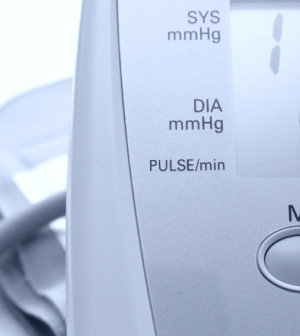- Could Your Grocery Store Meat Be Causing Recurring UTIs?
- Are You Making This Expensive Thermostat Error This Winter?
- Recognizing the Signs of Hypothyroidism
- 10 Strategies to Overcome Insomnia
- Could Artificial Sweeteners Be Aging the Brain Faster?
- Techniques for Soothing Your Nervous System
- Does the Water in Your House Smell Funny? Here’s Why
- Can a Daily Dose of Apple Cider Vinegar Actually Aid Weight Loss?
- 6 Health Beverages That Can Actually Spike Your Blood Sugar
- Treatment Options for Social Anxiety Disorder
Yoga Called Good Medicine for High Blood Pressure

Yoga may help reduce blood pressure in people who are at risk for developing hypertension, a new study finds.
“Patients with pre-hypertension [slightly elevated blood pressure] are likely to develop hypertension [high blood pressure] unless they improve their lifestyle,” said study author Dr. Ashutosh Angrish. He is a cardiologist at Sir Gangaram Hospital in Delhi, India.
“Both pre-hypertension and high blood pressure increase the risk of heart attack, stroke and heart failure,” Angrish added.
The new study included 60 people who had slightly elevated blood pressure but were otherwise healthy. The participants were randomly assigned to either practice hatha yoga while also making conventional lifestyle changes, or to just make the lifestyle changes (the “control” group). The lifestyle changes included moderate aerobic exercise, eating a healthier diet and quitting smoking.
The yoga group, average age 56, received yoga instruction for a month and then did the activity at home. It included stretching, controlled breathing and meditation for one hour a day. The average age of the control group participants was 52, according to the researchers.
After three months, those in the yoga group had notable decreases in blood pressure, while those in the control group did not, the investigators found.
Blood pressure is made up of two numbers. The top number is called systolic pressure. This measures the pressure in the arteries when blood is pumped from the heart. The bottom number — diastolic pressure — measures the pressure between heartbeats. Blood pressure is expressed in millimeters of mercury (mm Hg).
Angrish and his colleagues found that people in the yoga group had 24-hour diastolic blood pressure and night diastolic blood pressure decreases of about 4.5 mm Hg, and 24-hour average arterial pressure decreases of about 4.9 mm Hg.
“Although the reduction in blood pressure was modest, it could be clinically very meaningful because even a 2 mm Hg decrease in diastolic blood pressure has the potential to decrease the risk of coronary heart disease by 6 percent and the risk of stroke and [mini-stroke] by 15 percent,” Angrish said.
“Our research suggests that patients with pre-hypertension should be advised to practice hatha yoga for one hour daily. It may prevent the development of hypertension and in addition give a sense of well-being,” he added in a news release from the European Society of Cardiology.
The findings were presented Wednesday at the annual meeting of the Cardiological Society of India, in Kochi. Research presented at meetings should be considered preliminary until published in a peer-reviewed journal.
More information
The U.S. National Heart, Lung, and Blood Institute explains how to prevent high blood pressure.
Source: HealthDay
Copyright © 2026 HealthDay. All rights reserved.










